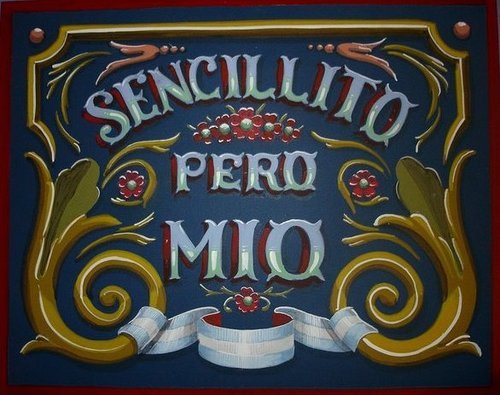Things Argentinians say
Six months ago, I wrote about what I had learnt from Argentinians. After spending a year in Argentina, I have finally stopped eating dulce de leche every day, I use un par to describe large numbers that I am not sure of, and I am addicted to mate. Perfect. Yet, there are still parts of the language that make me curious. Here are some peculiarities of Argentinian language that you won’t find in other hispanophone countries.

Cortar la luz
This took me a while to figure out. Someone told me that they hadn’t been able to use the internet because ‘se cortó la luz’. I spent a while thinking to myself ‘even if your light doesn’t work, you can still use your computer, right?’. After some confusion, I realised that it wasn’t just the light that wasn’t working, but all electricity.
Ahí nomás
This is a very short phrase that many Argentinians may not even realise they say, in which all the words may be combined into a quick ‘Ainomá‘. Generally, people have said it to me when they want me to, for example, stop pouring more beer into their glass. However, I have also heard it as a polite substitute for “Please, stop doing what you are doing, because I am going to do it”. I can think of many times that I have tried to do the washing up in someone’s house, and the reaction of the host has been a quick “ahí nomás”.
Zapallo
I learnt Spanish in Spain, where a pumpkin is a calabaza, and a courgette (U.S. zucchini) is calabacin. In Argentina there is a fantastic variety of vegetables in the pumpkin family, however, they all seem to be called zapallo. Maybe it will be big (grande), long (largo), round (redondito), or Italian (Italiano), but it’s always zapallo.
Chamuyar
This is a fantastic expression which goes well with the personality of Argentina. People often say that Argentinians are big flirts, and so it makes sense that they have their own word for their actions – chamuyando. If a guy is always flirting, people will say he is a chamuyo. This term might also be used for someone who is very good at selling something.
Cacerolazo
One warm evening in December I started hearing the loud bang of sticks hitting metal. I went outside and walked to the Avenida Rivadavia, and saw thousands of people walking in the street in the direction of congress. My housemate told me that this was a huge cazerolazo. I immediately could see why it was called this, as everyone from young to old were bashing household pots and pans. If other places in the world do this, then I haven’t seen it yet!
Naughty words
In English, bad words are generally related to sexual acts or excrement. This is also true in Spain, however, in Argentina people feeling frustrated might talk about shells and parrots.
Besos
This point is not about verbal language, but body language. In many places in the world, I am not sure how to greet people. There is nothing more embarrassing than trying to give two cheek-kisses in a place where the people only give one, or none! One thing that I like about Buenos Aires is that everyone gives one kiss on the cheek, regardless of gender. Easy.
Are there any parts of Argentinian language that I’ve missed out? Let me know in the comments section below.
Podcast: Play in new window | Download


Nice article 😂
Thanks Barbara!
You made me laugh!!! Great article, I will use it in my classes. Hope you had a great time in our land.
Thanks Valeria! I am very happy to see someone use my articles in their classes!
Regarding the naughty words section.
The shells of which you speak, “Concha” is a slang term for a woman’s parts. Perhaps equivalent to the English word c**t.
And the reference to parrots is also another slang term, for prostitutes. As it was explained to me, it came from the idea that prostitutes wear so much makeup they look like parrots. So, the common phrase “La concha de la lora” would be something like “The parrot’s c**t” in English. The parrot, of course, being a prostitute. 🙂
It’s probably also worth noting that in Argentina, everyone from 8 to 108 years old curses and swears like there’s no tomorrow and nobody so much as bats an eye. It an art form.
Haha. Thanks JT. Yeah, the fact that I didn’t explain these words was kind of like an in-joke for Argentinians.
I agree that Argentinians do swear more than most people. Even old people!
Loved to heard this! Is funny to know what parts of our language makes you curious.
BTW, when you talked about “bad words” do you know that is actually not about “shells”?
Haha, I know, Maria! I have a good imagination. 😉
I really love your post. I will use it in my class. It’s great to know what you think about our language!!! Now, I want more!
Thanks very much Naty! I am very happy that you will use it in class!
According to my latin friends in the US we say…viste? a lot! Besides, they make fun of me because we say ” anana, frutilla and pileta” 🤔
Hi Dania! Yes that is totally true! I think frutilla is said in several South American countries, and Anana is very international, but pileta I had never heard before being in Argentina!